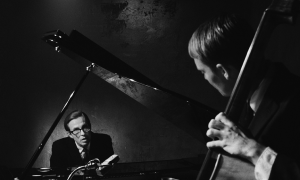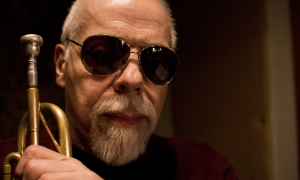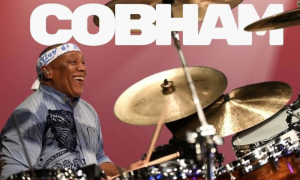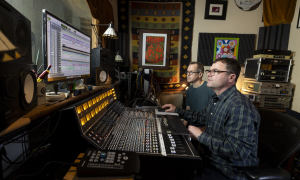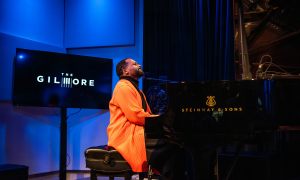
Baltimore's Left Bank Jazz Society was formed in 1964. It's claim to fame was promoting more than 800 jazz concerts at the city's Famous Ballroom at 1717 North Charles Street. Nearly every major jazz artist who came through the city was booked by the Society into the Ballroom, its interior modeled after New York's Roseland Ballroom. Most of the jazz shows initially were held on Sundays at 5 p.m., probably because it was the only evening when the space wasn't booked.
The ballroom was originally built as a streetcar barn in 1892 and still stands, though it has been renamed the Charles Theatre. The Society's concerts continued into the 1970s, and the price of admission was $6. You could bring your own food and drink, or order barbecue from the kitchen. The ballroom ended its jazz run in 1984 as hip-hop became more popular and profitable. The Society moved its jazz gigs to Coppin State College's Tawes Center Ballroom until 2002.
I provide all of this background to set up the release of three new albums that were recorded at the Famous Ballroom—Sonny Stitt: Boppin' in Baltimore, Shirley Scott: Queen Talk and Walter Bishop Jr.: Bish at the Bank. All three were co-produced by Zev Feldman and Cory Weeds. The Stitt album has been released on Zev's new Jazz Detective label. The latter two are on Cory and Zev's Reel to Real joint-partnership label.
I have been collecting Sonny Stitt albums since 1971, so I was a little suspect. Do we really need another one? Actually, we do, and Stitt fans will be very happy. The material on Boppin' in Baltimore was recorded on November 11, 1973, and features Stitt playing alto and tenor saxophones. He was backed by Kenny Barron on piano, Sam Jones on bass and Louis Hayes on drums. Stitt throughtout is fluid, fleet and in the pocket, rolling out bop line after bop line with a stunning smoothness. The album reminded me how wonderful Stitt was in the ealry 1970s on albums such as Constellation, Tun Up and Goin' Down Slow. The eight tracks on the new album are Baltimore Blues, Star Eyes, Lover Man, They Can't Take That Away From Me, A Different Blues, Stella by Starlight, Deuces Wild and The Theme. The fidelity is fabulous and the material is first-rate.
The Shirley Scott CD, Queen Talk, features Scott on organ, George Coleman on tenor saxophone, Bobby Durham on drums and Ernie Andrews on vocals on three tracks. This live material is unlike Scott's 1960s albums, which captured her in a tight, soulful groove. In effect, it's Coleman's record with Scott accompanying, if you can hear her. Scott fans might be disappointed that she isn't front and center. Coleman rips through the album's songs with ferocity, which grows weary fast. Unfortunately, he seems more passionate about roaring around the room on his saxophone than giving songs the love they deserve. The tracks are Impressions, Never Can Say Goodbye, Like Someone in Love, Witchcraft, Blues by Five, By the Time Get to Phoenix, Smile, You Don't Mess Around With Jim, Girl Talk and Blues. Andrews sings on the latter three. I love Ernie and interviewed him for my Rock Concert book before he died in February, but this isn't his best outing. In fact, everything on the album sounds rushed, scattered and disinterested.
Walter Bishop Jr.'s Bish at the Bank, features Harold Vick Jr. on tenor and soprano saxophone, and flute; Lou McIntosh on bass and Dick Berk on drums. Recorded at the height of the Coltrane phenomenon in 1966 and '67, everyone is pounding away freely on their instrument and we don't get to hear much Bish. There are glimmers of the pianist in trio format on the early part of The Days of Wine and Roses, but once Vick comes in, the song quickly becomes a free-for-all. Things settle down a bit on Quiet Nights when Vick breaks out the flute. But the group returns to the blowtorch on If I Were a Bell, So What and Willow Weep for Me. For me, the music is like witnessing someone pry open the back of a beautiful timepiece and mangle the contents trying to put it all back together. Interestingly, Vick finally gets his bearing on the final track, Pfrancing (No Blues), and delivers a beautiful and coherent tenor solo. Understandably, it was hard being a working jazz musician in the late 1960s. There was little money and even less praise. Sadly, as on this album, the musicians took it out on the songs. While that approach may have been in vogue then, it's tedious today.
Sonny Stitt died in 1982, Shirley Scott in 2002 and Walter Bishop Jr. in 1998.
The ballroom was originally built as a streetcar barn in 1892 and still stands, though it has been renamed the Charles Theatre. The Society's concerts continued into the 1970s, and the price of admission was $6. You could bring your own food and drink, or order barbecue from the kitchen. The ballroom ended its jazz run in 1984 as hip-hop became more popular and profitable. The Society moved its jazz gigs to Coppin State College's Tawes Center Ballroom until 2002.
I provide all of this background to set up the release of three new albums that were recorded at the Famous Ballroom—Sonny Stitt: Boppin' in Baltimore, Shirley Scott: Queen Talk and Walter Bishop Jr.: Bish at the Bank. All three were co-produced by Zev Feldman and Cory Weeds. The Stitt album has been released on Zev's new Jazz Detective label. The latter two are on Cory and Zev's Reel to Real joint-partnership label.
I have been collecting Sonny Stitt albums since 1971, so I was a little suspect. Do we really need another one? Actually, we do, and Stitt fans will be very happy. The material on Boppin' in Baltimore was recorded on November 11, 1973, and features Stitt playing alto and tenor saxophones. He was backed by Kenny Barron on piano, Sam Jones on bass and Louis Hayes on drums. Stitt throughtout is fluid, fleet and in the pocket, rolling out bop line after bop line with a stunning smoothness. The album reminded me how wonderful Stitt was in the ealry 1970s on albums such as Constellation, Tun Up and Goin' Down Slow. The eight tracks on the new album are Baltimore Blues, Star Eyes, Lover Man, They Can't Take That Away From Me, A Different Blues, Stella by Starlight, Deuces Wild and The Theme. The fidelity is fabulous and the material is first-rate.
The Shirley Scott CD, Queen Talk, features Scott on organ, George Coleman on tenor saxophone, Bobby Durham on drums and Ernie Andrews on vocals on three tracks. This live material is unlike Scott's 1960s albums, which captured her in a tight, soulful groove. In effect, it's Coleman's record with Scott accompanying, if you can hear her. Scott fans might be disappointed that she isn't front and center. Coleman rips through the album's songs with ferocity, which grows weary fast. Unfortunately, he seems more passionate about roaring around the room on his saxophone than giving songs the love they deserve. The tracks are Impressions, Never Can Say Goodbye, Like Someone in Love, Witchcraft, Blues by Five, By the Time Get to Phoenix, Smile, You Don't Mess Around With Jim, Girl Talk and Blues. Andrews sings on the latter three. I love Ernie and interviewed him for my Rock Concert book before he died in February, but this isn't his best outing. In fact, everything on the album sounds rushed, scattered and disinterested.
Walter Bishop Jr.'s Bish at the Bank, features Harold Vick Jr. on tenor and soprano saxophone, and flute; Lou McIntosh on bass and Dick Berk on drums. Recorded at the height of the Coltrane phenomenon in 1966 and '67, everyone is pounding away freely on their instrument and we don't get to hear much Bish. There are glimmers of the pianist in trio format on the early part of The Days of Wine and Roses, but once Vick comes in, the song quickly becomes a free-for-all. Things settle down a bit on Quiet Nights when Vick breaks out the flute. But the group returns to the blowtorch on If I Were a Bell, So What and Willow Weep for Me. For me, the music is like witnessing someone pry open the back of a beautiful timepiece and mangle the contents trying to put it all back together. Interestingly, Vick finally gets his bearing on the final track, Pfrancing (No Blues), and delivers a beautiful and coherent tenor solo. Understandably, it was hard being a working jazz musician in the late 1960s. There was little money and even less praise. Sadly, as on this album, the musicians took it out on the songs. While that approach may have been in vogue then, it's tedious today.
Sonny Stitt died in 1982, Shirley Scott in 2002 and Walter Bishop Jr. in 1998.
This story appears courtesy of JazzWax by Marc Myers.
Copyright © 2026. All rights reserved.







